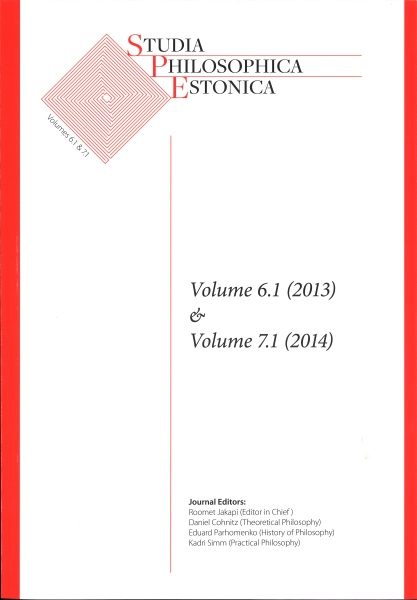Entscheidung als Häresie
DOI:
https://doi.org/10.12697/spe.2014.7.1.03Keywords:
Ethik, Entscheidung, Unentscheidbare, Freiheit, Verantwortung, Subjekt, Überlegung, Gesetz, Aporie, ethics, decision, undecidability, freedom, responsibility, subject, deliberation, law, aporiaAbstract
Man könnte sagen, dass Aristoteles so etwas wie eine traditionelle und dominierende Auffassung der Entscheidung in der westlichen Philosophie gründet. Das Ziel dieses Aufsatzes ist es, diese Auffassung von Aristoteles zu entwerfen, einige ihrer wichtigsten Probleme anzusprechen, und sie damit zu kontrastieren, was ich Jacques Derridas häretische „Konzeptualisierung“ der Entscheidung nennen würde. Es wird gezeigt, dass diese häretische Thematisierung von Derrida nicht nur und einfach mit dem traditionellen aristotelischen Begriff bricht, sondern vielmehr auch zu Recht einige seiner wichtigsten Züge auf solcher Weise schärft, dass von diesem radikalisierten Standpunkt die Behandlung von Aristoteles als die Annullierung der Entscheidung zum Vorschein kommt. Es wird zudem impliziert, wie Derridas häretische Auffassung die Erneuerung der Ethik und Politik mit sich bringt.
It might be said that Aristotle institutes something like a traditional and dominating concept of decision in the philosophical tradition of the West. The aim of this article is to outline that concept of Aristotle, touching on some of its most important problems, and contrast it with what I would call Jacques Derrida’s heretical understanding of decision. It will be shown that this heretical “conceptualization” by Derrida doesn’t simply and merely break with, or depart and differ from, the traditional Aristotelian concept but rather also justifiably sharpens some of its most central features in such a way that from that radicalized point of view the treatment of Aristotle comes to appear as the very annulment of decision. It is moreover implied how Derrida’s heretical understanding of decision entails a renewal of ethics and politics.
Downloads
References
Aristoteles (1995). Erste Analytik, in Aristoteles, Philosophische Schri.en I, Felix Meiner Verlag, Hamburg.
Aristoteles (2006). Nikomachische Ethik, Reclam, Stuttgart.
Aristotle (1935). Eudemian Ethics, in Aristotle, The Athenian Constitution. The Eudemian Ethics. On Virtues and Vices, Harvard University Press, Cambridge.
Aristotle (2002). Nicomachean Ethics, Oxford University Press, Oxford.
Broadie, S. (2002). Philosophical introduction, in Aristotle, Nicomachean Ethics, Oxford University Press, Oxford, S. 9-91.
Cosmus, O. (2001). Anonyme Phänomenologie. Die Einheit von Heideggers Denkweg, Königshausen & Neumann,Würzburg.
Critchley, S. (1992). The Ethics of Deconstruction: Derrida and Levinas, Blackwell, Oxford.
Derrida, J. (1967). Violence et metaphysique: Essai sur la pensee d’Emmanuel Levinas, in J. Derrida L’Écriture et la di.Érence, Seuil, Paris, S. 117-229.
Derrida, J. (1988). The politics of friendship, The Journal of Philosophy 55: 632-644.
Derrida, J. (1990). Force de loi: «le fondement mystique de l’autoritÉ Â», Cardozo Law Review 11: 919-1045.
Derrida, J. (1994). Politiques de l’amitiÉ, Editions GalilÉe, Paris.
Derrida, J. (1995). The Gift of Death, University of Chicago Press, Chicago.
Derrida, J. (1996). Remarks on deconstruction and pragmatism, in C.Mouffe (hrsg.), Deconstruction and Pragmatism, Routledge, London, S. 77-88.
Derrida, J. (1997). Adieu à Emmanuel Levinas, Galilee, Paris.
Derrida, J. (2000). As If I were Dead – Als ob ich tot wäre, Turia und Kant Verlag,Wien.
Derrida, J. (2002). Nietzsche and the machine, in E. Rottenberg (hrsg.),
Negotiations: Interventions and Interviews, 1971-200 Stanford University Press, Stanford, S. 215-256.
Derrida, J. (2003). Eine gewisse unmögliche Möglichkeit, vom Ereignis zu sprechen, Merve Verlag, Berlin.
Heidegger, M. (1989). Beiträge zur Philosophie (vom Ereignis), in F.-W. v. Herrmann (hrsg.), Gesamtausgabe 6 Vittorio Klostermann, Frankfurt am Main.
Kierkegaard, S. (1992). Furcht und Zittern, Europäische Verlagsanstalt, Hamburg.
Kimmerle, H. (2005). Jacques Derrida interkulturell gelesen, Traugott Bautz, Nordhausen.
Kuhn, H. (1960). Der Begri. der Prohairesis in der Nikomachischen Ethik, in D. Henrich, W. Schulz and K.-H. Volkmann-Schluck (hrsg.), Die Gegenwart der Griechen im neueren Denken: Festschri. für Hans-Georg Gadamer zum 60. Geburtstag, J.C.B. Mohr, TÜbingen, S. 123-140.
Lilla, M. (2001). The RecklessMind: Intellectuals in Politics,New York Review of Books, New York.
Mansfield, N. (2006). Refusing defeatism: Derrida, decision and absolute risk, Social Semiotics 16: 473-483.
Pfeu.er, S. (200.). Die Entgrenzung der Verantwortung: Nietzsche- Dostojewskij-Levinas,Walter de Gruyter, Berlin.
Rapp, C. (1995). Freiwilligkeit, Entscheidung, Verantwortlichkeit, in O.Höffe (hrsg.), Aristoteles: Die Nikomachische Ethik, Akademie Verlag, Berlin, S. 127-133. Klassiker Auslegen, Bd. 2.
Rawls, J. (1993). Political Liberalism, Columbia University Press, New York.
Robinson, R. (1995). Aristotle on Akrasia, in O. Höffe (hrsg.), Aristoteles: Die Nikomachische Ethik, Akademie Verlag, Berlin, S. 1.7-206. Klassiker Auslegen, Bd. 2.
Ross, D. (19.5). Aristotle, Methuen & Co, New York.
Schmidt, E. (2006). Anmerkungen, in Aristoteles, Nikomachische Ethik, Reclam, Stuttgart, S. 303-353.
Sokolo.,W. (2005). Between justice and legality: Derrida on decision, Political Research Quarterly 58: 341-352.
Undusk, J. (199.). Maagiline müstiline keel, Virgela, Tallinn.
Ungureanu, C. (200.). Derrida on free decision: Between Habermas’ discursivism and Schmitt’s decisionism, The Journal of Political Philosophy 16: 293-325.

